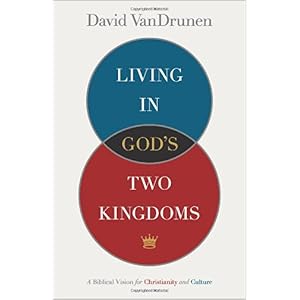Occasionally I'll browse through Carrie's stash of un-reviewed new book releases, looking for a title that piques my interest. (There's a certain pride in discovering a good new book before she gets around to reading it!) This particular title, Living in God's Two Kingdoms, by David VanDrunen, was put out recently by Crossway, and after I spent a few weeks reading and digesting it, Carrie suggested that I share my thoughts with y'all.
This particular title, Living in God's Two Kingdoms, by David VanDrunen, was put out recently by Crossway, and after I spent a few weeks reading and digesting it, Carrie suggested that I share my thoughts with y'all.
This book struck at a particularly relevant time for me, as I've been trying to pay more attention to politics and the effects of the recent elections, and at the same time trying to work out an appropriate, scripturally-based attitude for myself toward politics and that aspect of cultural involvement.
For those who are unfamiliar (as I was) with the "Two-Kingdom" theology described in the title of this book, it refers to:
- The "common kingdom" being the fallen world in which we live and operate from day to day, involving our vocation, culture, politics, music, marriage, education, children, hobbies, sports, etc.
This was formalized by God's covenant with Noah (Gen. 8-9) in which God promised to sustain the natural world, the animal kingdom, and human activities (procreation, justice, etc.) - The "redemptive kingdom" being the spiritual, heavenly bond first established by God through his covenant with Abraham (Gen. 15-17), in which eternal salvation by faith is granted to a particular group of people. In the New Testament, this salvation is extended to Jews and Gentiles alike through Christ's atonement.
The redemptive kingdom will one day culminate in the "new heaven and new earth" described in Rev. 21; but, for now, we as Christians are called to live, as it were, with one foot in each kingdom.
In the common kingdom, we work hard at our jobs, enjoy our pastimes, take care of the physical needs of our families, submit to our rulers, etc. This aspect of our lives may not appear to be very different from the way some unbelievers conduct themselves. As Christians, should we be worried about this? Should we demand that the way we live our regular lives as Christians always appear different than our non-Christian counterparts?
VanDrunen, argues, "No." We shouldn't be using the yardstick of the common kingdom to measure the depth and maturity of our faith as Christians. (Compare this to the Catholic tradition of associating self-denial, and a host of other behaviors, with piety.) For example, a Christian plumber, other than perhaps the "ichthus" sticker on his car, will probably approach his daily tasks just as an unbelieving plumber might. And the world will hold them both to the same expectations — to deal fairly in business, and to keep the pipes from leaking.
But, when it comes to the redemptive kingdom, everything changes. God has given Christians and the church a unique set of responsibilities and privileges! Many passages of scripture are written and intended specifically for God's chosen people. (For example, rather than the Ten Commandments or the Sermon on the Mount being set forth as a general moral law for all mankind, they represent the ways God expected His people to be "set apart" from the rest of the world in their behavior and conduct.)
As another example, VanDrunen points out how verses like Jer. 29:11 are often incorrectly applied to the common kingdom, and are used by Christians as a general encouragement toward better health, finances, relationships, etc.: "For I know the plans I have for you, declares the LORD, plans for welfare and not for evil, to give you a future and a hope." When actually, in the original context, this verse specifically represents a promise by God for the salvation of the His people. (Which truly should be of far greater importance to us!)
VanDrunen walks through many scriptures, viewing them through this "two-kingdom" lens to bring a sense of context that is refreshingly clear in describing how we, as Christians, should relate to God, to each other, and to the world around us. I've already noticed how this has shaped my thinking in every-day situations, and it has definitely changed the way that I read and understand God's word.
This book will definitely force you to think. (Not always a bad thing!) It definitely does require some attention to fully read and absorb (at least, it did for me, but I was not very familiar with many of these subjects.) However, it's written in an approachable style that is rarely dry or academic, and, weighing in at about 200 pages long, its length is manageable. I, for one, am glad to have read it.







2 comments:
It sounds like there are shades of Augustine in there. Very interesting.
Wow. How can both of you write such solid reviews? Thank you, Jonathan for sharing. The post alone clarified some thinking for me. THis looks like a very good book...one to read.
Thanks for sharing!
(And how did you get the little flowers to type?)
Post a Comment